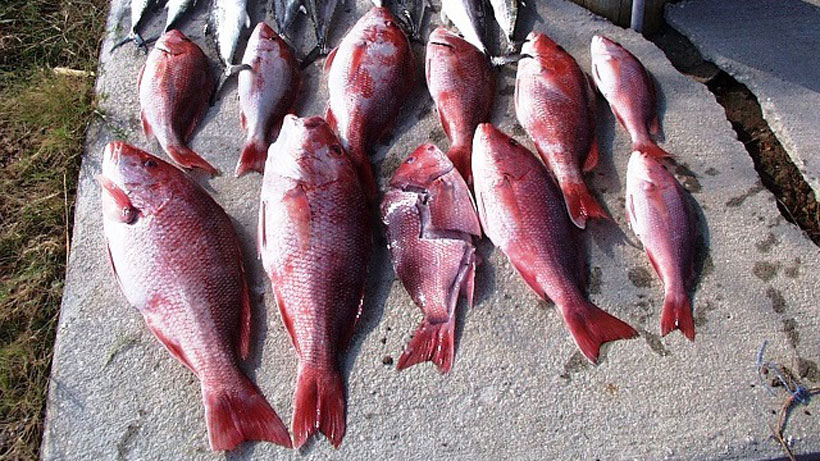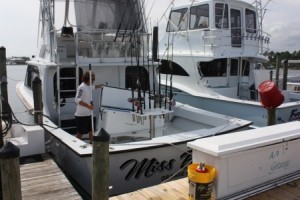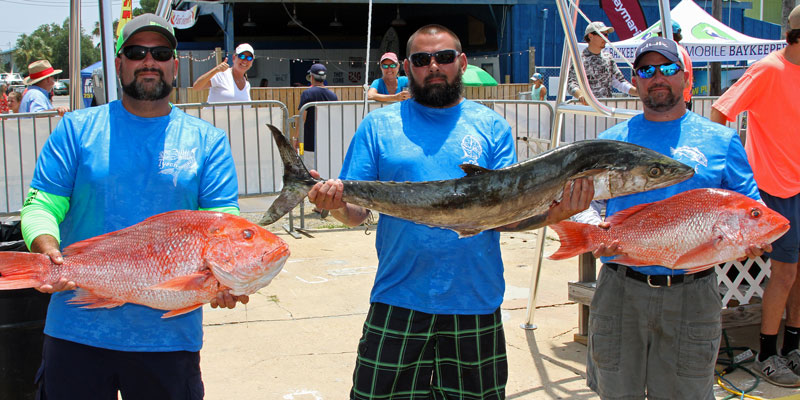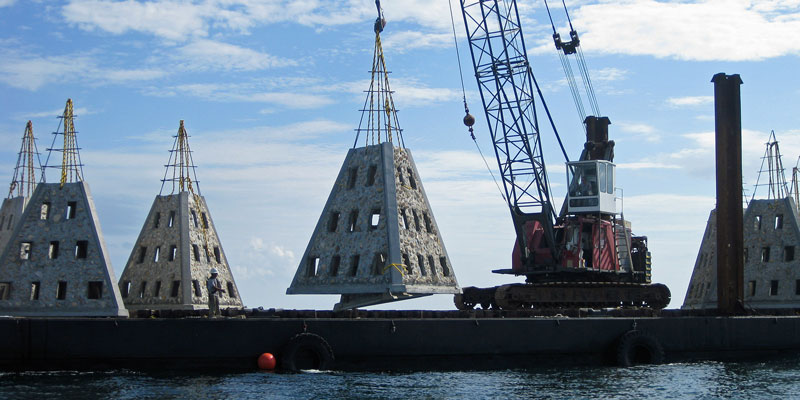
A longer state red snapper season and expanded state waters where anglers can fish are expected to provide a boost to the coastal tourist economy this summer.
“It should be good for our bottom line,” said Mike Giannini, one of the owners of J&M Tackle on Canal Road in Orange Beach. “It’ll increase fuel sales, ice sales, bait sales, tackle sales, just about everything.”
Longer season, expanded waters expected to boost Alabama red snapper fishing from Alabama NewsCenter on Vimeo.
Red snapper season will be open in Alabama waters from Friday, May 27, through July 31, giving anglers two full months to fish. Last year, U.S. Sen. Richard Shelby of Alabama attached an amendment to the General Fund budget that extends state waters for Alabama, Mississippi and Louisiana to nine miles from the coast for the purposes of managing reef fish, including snapper.
The move aligned the state waters of those three states with the state waters for Florida and Texas. Before this year, the federal government recognized Alabama’s authority only over waters extending three miles from the coast.
The expanded territory is important to anglers.
“It makes a big difference when it comes to the amount of structure available to fishermen to fish,” said Chris Blankenship, director of Alabama’s Division of Marine Resources.
Snapper are good to eat and relatively easy for anglers to locate. That has made them what Herb Malone, president and CEO of Gulf Shores and Orange Beach Tourism, calls Alabama’s “flagship fish.”
“Anybody with a boat who knows how to use a GPS can find snapper,” Malone said.
Alabama’s artificial reef system
Snapper are reef fish. They live around structure whether natural, like rocks or coral, or manmade, like sunken ships or concrete rubble. Alabama has few natural reefs off its tiny coast and had few if any snapper before about 35 years ago.
Beginning in the late 1970s, the state and private individuals sank ships, tanks and armored vehicles, concrete pyramids and rubble off the coast. It now has the largest artificial reef system in the country, and upward of 35 percent of the total snapper catch in the Gulf of Mexico comes off the Alabama coast.

The longer season and expanded state waters “is going to be huge for us,” said Mark Russo, manager of Sam’s, a store on Canal Road in Orange Beach that caters to fishermen. “Now that we’ve got the longer season, we need to put more structure in the nine miles controlled by the state.”
Reeling in revenue
Recreational saltwater fishing is an integral part of tourism and has a considerable impact on Alabama’s economy – almost $930 million, according to the Department of Conservation and Natural Resources Marine Resources Division.
“It really sustains our economy,” said Hunter Greene, captain of a private fishing boat. “We’re a service-based economy. We serve the tourists. Without snapper season, people aren’t making any money.”
The state announced its longer season on the same day that NOAA Fisheries, the federal agency empowered with regulating red snapper, announced that recreational fishermen would be allowed only nine days beginning June 1 to fish for red snapper in the federally controlled waters beyond the nine-mile state boundary. Charter boats are allowed to fish from June 1 through July 17. The daily limit is two snapper per person.
The federal restrictions are based on a reauthorization of the Magnuson Stevens Act that gives the federal government authority over red snapper in federal waters. The brief federal seasons of recent years are a radical shift from a little more than a decade ago, when anglers were allowed to fish May through October and keep four snapper per person, per day.
A shorter federal snapper season
Bobby Kelly, captain of the charter boat Miss Brianna, questions whether the changes to the state season will really help fishermen.
“I feel that the state water expanded season is like daylight saving time,” Kelly said. “Does it create more daylight? No, it just pushes it around. It’s the same way with access to these fish.”

Kelly believes the shortened federal season is a reaction to longer state seasons. If the state season were shorter, federal authorities might be inclined to allow more days of fishing in federal waters.
Part of the problem is that there is no system in place to count all of the fish recreational anglers catch. Kelly thinks a tag system would be the best way to do that. Anglers would be issued a limited number of tags and every fish kept by anglers must have a tag attached to it. If state or federal enforcement officers caught a fisherman in possession of a snapper without a tag attached to it, the fisherman would be issued a citation and would be subject to a fine.
“The best thing for the private recreational angler is a management system that brings in accountability for the recreational angler,” Kelly said.
Others say federal authorities enacted restrictive seasons before the state expanded its territory and lengthened its season.
“A nine-day red snapper season is a disgrace for Alabama’s fishermen,” said Rep. Bradley Byrne, who represents Alabama’s Gulf Coast in Congress. “This type of ‘derby-style’ season poses serious challenges and puts the safety of our fishermen at risk. There are plenty of red snapper in the Gulf, but the federal government continues to do a terrible job of counting the number of fish, as well as the number caught each year.”
Safer fishing
Giannini noted that safety will be one of the primary benefits of Alabama’s longer season and expanded waters.
“Last year people fished under less than ideal conditions,” Giannini said. “This will allow them not to fish on days when they really shouldn’t be out there putting their boat and their lives at risk.”
Malone points out that the federal nine-day season encompasses only one weekend. That means the average working fisherman must either take vacation or face a de facto two-day season.
Having a state season that gives people a real opportunity to catch more snapper will definitely stimulate tourism, Malone said. It will help far more than bait and tackle stores, too. Recreational anglers keep boats at the coast or tow them from inland. They stay in hotels and condominiums, eat in restaurants and bring family members with them who shop and visit other tourist attractions.
“There’s a big difference in the amount of structure between three miles and nine miles,” Malone said. “That six miles is a huge difference. When you have the product we have, the red snapper, people will come.”










